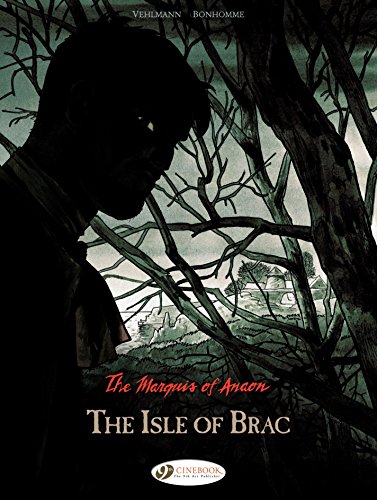
By Vehlmann & Bonhomme: coloured by Delf and translated by Mark Bence (Cinebook)
ISBN: 978-1-84918-255-3 (PB Album)
Win’s Christmas Gift Recommendation: A Daring Dip into the Dark Underside of History… 9/10
Fabien Vehlmann was only born in 1972 yet his prodigious canon of work (from 1998 to the present) has earned him the soubriquet of “the Goscinny of the 21st Centuryâ€. He entered the world in Mont-de-Marsan and grew up in Savoie, growing up to study business management before taking a job with a theatre group.
In 1996, after entering a writing contest in Le Journal de Spirou, he caught the comics bug and two years later published – with illustrative collaborator Denis Bodart – a mordantly quirky and sophisticated portmanteau period crime comedy entitled Green Manor. From there on his triumphs grew to include – many amongst others – Célestin Speculoos for Circus, Nicotine Goudron for l’Écho des Savanes and major-league property Spirou and Fantasio…
Scion of an artistic family, Matthieu Bonhomme received his degree in Applied Arts in 1992, before learning the comics trade working in the atelier of western and historical strip specialist Christian Rossi. Le Marquis d’Anaon was Bonhomme’s first regular series, running from 2002-2008, after which he began writing as well as illustrating a variety of tales from L’Âge de Raison, Le Voyage d’Esteban, The Man Who Shot Lucky Luke and others.
So, what’s it about? Imagine the X-Files set circa 1720s in France during the Age of Enlightenment, and played as a solo piece by a young hero growing reluctantly into the role of crusading troubleshooter…
Nomadic, middle class Jean-Baptiste Poulain is the son of a merchant, a disciple of Cartesian logic and former medical student. Educated but impoverished, he accepts a post to tutor the son of the mysterious Baron of Brac.
As he approaches the windswept, isolated island off the Brittany Coast, he cannot understand the fear and outrage he sees in the downtrodden villagers who secretly call their master “the Ogreâ€, and believe him to be a visiting nobleman. He is utterly astounded by how violently overprotective they are regarding their children…
The story gradually unfolds under ever-mounting tension, as the young man endures suspicion and hostility from the lowest classes, whilst slowly fostering a deep appreciation for the forward-thinking rationalist Baron. Soon, however, his student Nolwen is found murdered and, amid the heightened tensions, Poulain learns that this is not the first body to be found…
From then on, it’s hard to determine who is friend or foe and although a trained rationalist, Poulain begins to suspect unworldly forces are in play…
Conversations with the mariner known as the Storyteller lead to the tutor being attacked by villagers – or perhaps just thieves? – and, after barely escaping, the scholar sees murdered Nolwen before passing out…
He wakes under the Baron’s care and resolves to leave at the first opportunity. When housemaid Ninon begs him to take her with him, an incredible saga of unremitting horror is exposed, leading to Brac hunting his fleeing employees and trapping them in his hidden laboratory.
Here Poulain discovers the appalling experiments the Baron has indulged in, and the astounding answer to the “ghosts†who walk the island. When the Baron and his terrifying flunkey come for him, fortune favours the tutor and apparently divine justice is rendered unto all…
In the aftermath, Poulain escapes the island alone, as much to avoid the grateful fearful villagers as to resume his life. He cannot, sadly, outrun the title they have bestowed upon him: Le Marquis d’Anaon – the Marquis of Lost Souls…
With potent overtones of Jane Eyre and similar traditional gothic romances, L’ÃŽle de Brac was the first of five albums (all available in paperback and digital formats) tracing the development of a true hero against darkness and human venality. Moody, compelling and utterly enthralling, this is a spooky series well-deserving of a greater audience.
Original edition © Dargaud Paris 2002 by Vehlmann & Bonhomme. All rights reserved. English translation © 2015 by Cinebook Ltd.
